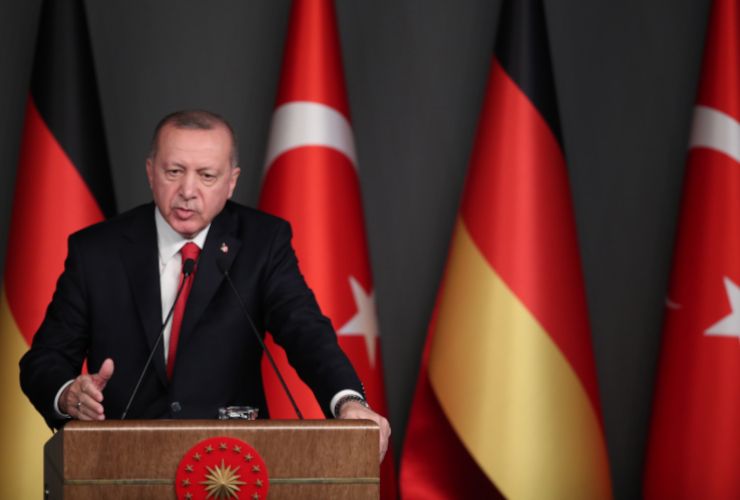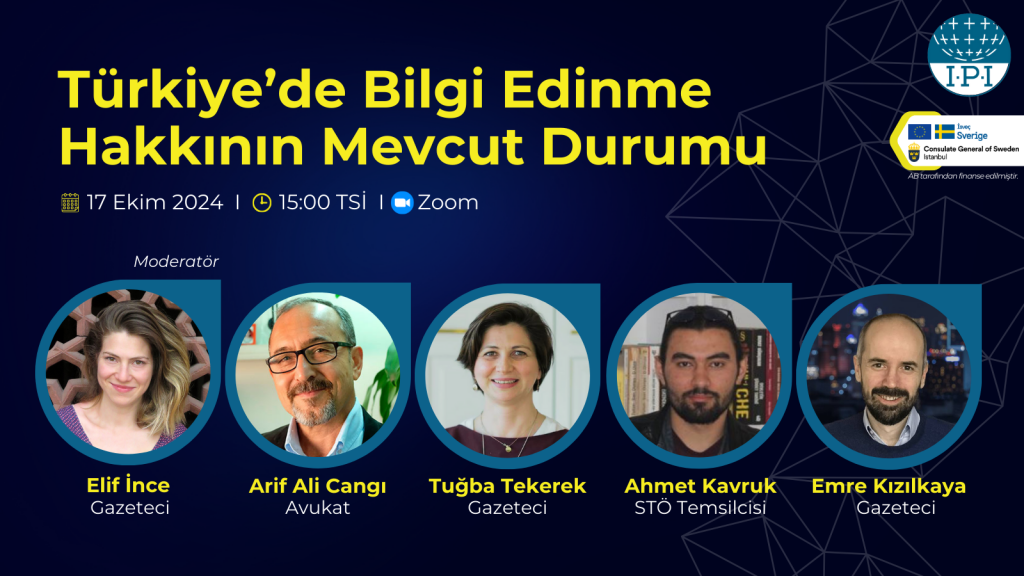In a healthy democracy, political leaders and holders of public office should always make themselves accountable to the public by being ready to respond to questions from journalists and critical groups. Increasingly, however, political leaders, including in some of the most established democracies, seek to avoid media scrutiny by denying critical media access and threatening those who produce unfavourable coverage. Turkish journalist Nevşin Mengü has seen first-hand how President Erdoğan has sought in recent years to manage and control his media appearances to ensure reliably positive coverage.
Views expressed in this article are those of the author and do not necessarily reflect the views of the International Press Institute.
There is quite a comprehensive literature available online if you ask a search engine for information on “questions that anger Erdoğan”. Looking back over recent years, there have been a number of questions that have really riled him.
One memorable incident took place during the peace process between the PKK and the Turkish government from 2010 to 2015. In 2010 Erdoğan was meeting with a number of women’s rights groups to discuss the process when one of the representatives asked: “Why doesn’t the government show the same sensitivity to the problems of Kurdish women as it shows to women with headscarves?”
This was a bold question as it revealed the poor status of fundamental freedoms in Turkey and the hypocrisy of the government’s position.
News articles at the time with headlines such as “the Prime Minister’s Fury” suggest that, while he lost his temper, he still managed to provide a proper answer: “We do not discriminate against women”.
In 2013, Erdoğan was holding a press conference on the Gezi Park protests when the Reuters correspondent at the time, Birsen Altaylı, asked “The demonstrations started in order to protect Gezi Park. Now they are increasingly seen as part of a more general popular protest against the government. It has been suggested that your condescending attitude towards the social movement created even more anger among the protestors. Do you agree and would you consider adopting a more conciliatory attitude?”
The image of Erdoğan, simmering with rage, bewildered by such a question remains seared into the memories of those who were there. Erdoğan accused Altaylı of misinforming Reuters before famously declaring “Our fifty percent don’t need to stay at home”, an implicit threat to mobilize his supporters to take to the streets against the Gezi protesters.
Hours later, Erdoğan reportedly stormed out of a meeting about the Gezi park’s planning attended by city planners and civil society representatives, saying “we are not going to learn city planning from you” when he felt his methods were questioned.
Until 2013, Erdoğan was mostly prepared to meet with dissident groups and answer critical questions from journalists and NGOs.
Since the Gezi protests, we have watched as the status of press freedom has deteriorated step by step. Erdoğan gradually withdrew from public TV discussions, and in those he did attend, the journalists and their questions were increasingly selected only. During press conferences, Erdogan’s press advisors ensured that the reporters and their questions were carefully vetted and approved in advance.
As the number of titles and honours Erdoğan held rose like the medals pinned to the chest of the former Soviet leader Leonid Brezhnev, so his tolerance of questions and critics diminished. In his journey from prime minister to president, we saw how the number of people who could get close enough to question Erdoğan fell to the number of fingers on one hand.
But just occasionally, the layer of protection around Erdoğan can still fail. During a press conference in late February 2020, Erdoğan was infuriated when FOX TV reporter Barış Kaya took the microphone and asked about Turkish soldiers recently killed in the Libyan conflict. “You have announced that we have martyrs in Libya. The opposition parties, however, ask why the martyrs’ names have not yet been revealed and why a ceremony has not taken place for them. Some people were also offended by your reference to soldiers lost in Libya as ‘some martyrs’, sir…”
At first, Erdoğan seemed not to understand the question and asked “What?” Then followed a long silence as Erdoğan stared at the FOX TV correspondent stunned by what he had just heard. It had been so long since anyone had actually asked him a real question in front of the cameras.
When Erdoğan finally responded he didn’t answer the question but instead stated. “Let FOX be a newspaper first, a real media outlet.” There has been much speculation about what this answer meant with many speculating that it was an implicit threat to FOX TV.
Journalists close to Erdoğan are already asking about what punishment the media outlet should receive. This is not ironic. Directly after the incident, another journalist asked Erdoğan how Fox TV should be punished. A question, it was noted, that Erdoğan rather enjoyed responding to.
Other questions Erdoğan likes include what the secrets to his healthy life are and what his favourite recipes for eggs are. Thanks to the fearless correspondents that currently surround the president we have also learnt that Erdoğan protects himself from coronavirus by drinking grape syrup (pekmez).
While it is unlikely to get answers from Erdoğan on the most compelling political topics of the day, it is quite possible to get his best “lifestyle” tips.
Being a politician carries a universally accepted responsibility to answer questions from journalists, citizens, and civil society organizations. Yet, probably because he sees himself above politics, President Erdoğan seems to insist on rejecting this responsibility.





